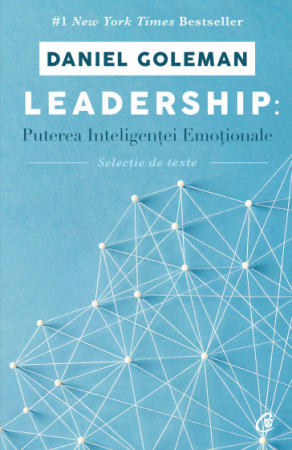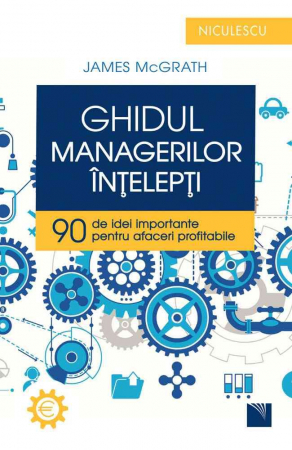Manuscript proposals: [email protected] / 0745 204 115 //// Tracking orders Individuals / Sales: 0745 200 357 / Orders Legal entities: 0721 722 783
ISBN: 978-606-28-0198-4
DOI: 10.5682/9786062801984
Publisher year: 2015
Edition: I
Pages: 174
Publisher: Editura Universitară
Author: Jan Ketil Arnulf, Marius Blajut
Product Code:
9786062801984
Do you need help?
0745 200 357
- Description
- Download (1)
- Authors
- Content
- More details
- Reviews (0)
The leader as a heroic person is a paradigm so widespread and so embraced (especially by employees) that we do not seem to want to see what academic studies and research show us: leadership seems more of a phenomenon group. It is the theory of post-heroic leadership, in which the leader is no longer seen as a hero, solely responsible for the smooth running of things, but rather as part of a team.
In today's business reality, where we talk about work teams from the formal school system, we should deepen and understand more this concept of posteroic leadership, and distinguish between leadership development and leadership development, between the responsibility of each person from the organization and the creation of action circles, instead of hierarchies and organizational charts.
In today's business reality, where we talk about work teams from the formal school system, we should deepen and understand more this concept of posteroic leadership, and distinguish between leadership development and leadership development, between the responsibility of each person from the organization and the creation of action circles, instead of hierarchies and organizational charts.
-
Despre leadership. Cum atingi rezultate remarcabile prin oameni obisnuiti
Download
JAN KETIL ARNULF
MARIUS BLAJUT
MARIUS BLAJUT
Foreword / 7
Chapter 1/11
LEADERSHIP - BETWEEN MYSTICISM AND SCIENCE / 11
Chapter 2/19
LEADERSHIP AND MANAGEMENT / 19
Responsible for results: Limited liability company as a social model / 20
Technology, management and strategic leadership / 25
The essence of the leadership phenomenon: Technically and socially validated decisions / 33
Entrepreneurship / 42
Chapter 3/49
THEORETICAL APPROACHES / 49
Biological explanations for leadership / 51
The notion of the great man / 59
Leadership - a profession / 69
Team leadership and post-heroic leadership / 85
Chapter 4/96
LEADERSHIP DANGERS / 96
Leadership - a romantic illusion / 97
The dark side of charisma / 100
Destructive leadership / 105
Chapter 5/111
LEADERSHIP CREATION: RECRUITMENT AND DEVELOPMENT / 111
Recruitment of leaders / 112
Leadership development / 125
Development of the leadership phenomenon / 138
Chapter 6/143
LEADERSHIP IN SPACE AND TIME / 143
Leadership and social resources / 144
Leadership and cultural differences / 150
Leadership in the future / 159
Note / 166
Chapter 1/11
LEADERSHIP - BETWEEN MYSTICISM AND SCIENCE / 11
Chapter 2/19
LEADERSHIP AND MANAGEMENT / 19
Responsible for results: Limited liability company as a social model / 20
Technology, management and strategic leadership / 25
The essence of the leadership phenomenon: Technically and socially validated decisions / 33
Entrepreneurship / 42
Chapter 3/49
THEORETICAL APPROACHES / 49
Biological explanations for leadership / 51
The notion of the great man / 59
Leadership - a profession / 69
Team leadership and post-heroic leadership / 85
Chapter 4/96
LEADERSHIP DANGERS / 96
Leadership - a romantic illusion / 97
The dark side of charisma / 100
Destructive leadership / 105
Chapter 5/111
LEADERSHIP CREATION: RECRUITMENT AND DEVELOPMENT / 111
Recruitment of leaders / 112
Leadership development / 125
Development of the leadership phenomenon / 138
Chapter 6/143
LEADERSHIP IN SPACE AND TIME / 143
Leadership and social resources / 144
Leadership and cultural differences / 150
Leadership in the future / 159
Note / 166
I must admit that after more than 15 years of activity, reading another book on leadership might seem useless or an inefficient use of time and so impatient with us. But those who have multiple professional experiences, realize how gratifying it is that after so many books, courses, discussions and thoughts, to come across a writing so easy, understandable, and yet so comprehensive and highly academic.
In his book, Jan Ketil Arnulf seems to be staying with us for a while, making a wide foray into the many facets of the concept of leadership and putting on the table the questions we all think about in the interaction with those around us, as trainers. managers or entrepreneurs: What does leadership mean in the end? And what do the results of a leader mean? Do we really need to borrow, understand and apply this term, or is it just a hoax? This book can be useful in outlining some well-founded answers.
After years in which the emerging market has given us speed and forced us to make instinctive decisions, based on a few principles and learn more from "trial and error" (the method of learning through "trial and failure"), the environment Romanian business and the new generations of professionals who come have the opportunity to return to theories, to impact books, so that the business behavior of leaders and employees to be as substantiated as possible.
The market of the 2000s did not allow us this approach, and, like a pendulum, we had to reach an extreme of pragmatism and action to recognize that we also need well-founded theories.
It is also an exhortation of my staff for budding professionals not to be fooled by the pragmatic cover of success stories. In the history of any businessman there are hours of searching for answers to questions, books on the nightstand or in the bag, discussions and drawings on coffee napkins, in search of understanding the already existing wheels.
"Let's not reinvent the wheel" can mean a book, like this one, in which from the multitude of existing information we are presented with a point of view, a structuring of concepts that can open a door and save us from going through. thousands of pages written so far. A point of view that of course must be viewed critically, passed through the filter of personal thinking and compared, discussed, but ultimately applied, or not. Because the purpose of any book and any discussion is to produce a change in thinking, but ultimately in behavior.
And how "about leadership it is easier to talk than to do" (pg 18) often here you can see the difference between those who pass a title to the "reading list" or change something!
As an entrepreneur for over 10 years, the author's image of entrepreneurs seemed at least funny to me. With the image of a heroic leader, the entrepreneur is first defined as a viewer in the future (the ability to have a totally different vision and create it, eg Steve Jobs), then as a strange, unadapted, who later acquires a sense of the elite of elites (eg Richard Branson, Oprah) with two valences: either that of hero-leaders or that of inspirational models. However, this very approach can explain why students and employees attribute the word "charisma" as defining for leaders and why the entrepreneur is often the leader in his business (term explained in detail on page 43). The foray into mythology, in the stories of the Great Man, by the Sumerian king Gilgamesh, creates an interesting connection between the origins of this word and the application of the concept of leadership today. By presenting Carlyle's conclusions, namely that "society is based on the cult of heroes", we understand why certain examples of success are so much publicized, why the leader is presented with this aura. And to what extent, the existence of these illusory expectations can lead to dangerous behaviors on the part of both leaders and employees.
"Man needs meaning in life," Jung said. And if this meaning is given by a story, the story can be created by people for people. And then our lives become more beautiful, fuller. And that's how we get to the leader who creates the story and the others who expect this from him!
The leader as a heroic person is a paradigm so widespread and so embraced (especially by employees) that we do not seem to want to see what our studies and academic research show us: leadership seems more like a group phenomenon. It is the theory of post-heroic leadership, in which the leader is no longer seen as a hero, the only one responsible for the smooth running of things, but rather as part of a team.
In today's business reality, where there is talk of work teams from the formal school system, this concept of posteroic leadership should be deepened and understood, and the difference between leadership development and development of leaders, between the responsibility of each person in the organization and the creation of action circles, instead of hierarchies and organizational charts.
We can get a new meaning, so that the stories are written in a circle, not waiting for a Fat-Frumos to appear on a white horse to save us and tell us the direction, but to assume that, being part of the story, we have each has a role in writing it, and each of us can be the leader of a page in the story.
Oana Calin
PhD student at the Doctoral School of Communication Sciences within the University of Bucharest
In his book, Jan Ketil Arnulf seems to be staying with us for a while, making a wide foray into the many facets of the concept of leadership and putting on the table the questions we all think about in the interaction with those around us, as trainers. managers or entrepreneurs: What does leadership mean in the end? And what do the results of a leader mean? Do we really need to borrow, understand and apply this term, or is it just a hoax? This book can be useful in outlining some well-founded answers.
After years in which the emerging market has given us speed and forced us to make instinctive decisions, based on a few principles and learn more from "trial and error" (the method of learning through "trial and failure"), the environment Romanian business and the new generations of professionals who come have the opportunity to return to theories, to impact books, so that the business behavior of leaders and employees to be as substantiated as possible.
The market of the 2000s did not allow us this approach, and, like a pendulum, we had to reach an extreme of pragmatism and action to recognize that we also need well-founded theories.
It is also an exhortation of my staff for budding professionals not to be fooled by the pragmatic cover of success stories. In the history of any businessman there are hours of searching for answers to questions, books on the nightstand or in the bag, discussions and drawings on coffee napkins, in search of understanding the already existing wheels.
"Let's not reinvent the wheel" can mean a book, like this one, in which from the multitude of existing information we are presented with a point of view, a structuring of concepts that can open a door and save us from going through. thousands of pages written so far. A point of view that of course must be viewed critically, passed through the filter of personal thinking and compared, discussed, but ultimately applied, or not. Because the purpose of any book and any discussion is to produce a change in thinking, but ultimately in behavior.
And how "about leadership it is easier to talk than to do" (pg 18) often here you can see the difference between those who pass a title to the "reading list" or change something!
As an entrepreneur for over 10 years, the author's image of entrepreneurs seemed at least funny to me. With the image of a heroic leader, the entrepreneur is first defined as a viewer in the future (the ability to have a totally different vision and create it, eg Steve Jobs), then as a strange, unadapted, who later acquires a sense of the elite of elites (eg Richard Branson, Oprah) with two valences: either that of hero-leaders or that of inspirational models. However, this very approach can explain why students and employees attribute the word "charisma" as defining for leaders and why the entrepreneur is often the leader in his business (term explained in detail on page 43). The foray into mythology, in the stories of the Great Man, by the Sumerian king Gilgamesh, creates an interesting connection between the origins of this word and the application of the concept of leadership today. By presenting Carlyle's conclusions, namely that "society is based on the cult of heroes", we understand why certain examples of success are so much publicized, why the leader is presented with this aura. And to what extent, the existence of these illusory expectations can lead to dangerous behaviors on the part of both leaders and employees.
"Man needs meaning in life," Jung said. And if this meaning is given by a story, the story can be created by people for people. And then our lives become more beautiful, fuller. And that's how we get to the leader who creates the story and the others who expect this from him!
The leader as a heroic person is a paradigm so widespread and so embraced (especially by employees) that we do not seem to want to see what our studies and academic research show us: leadership seems more like a group phenomenon. It is the theory of post-heroic leadership, in which the leader is no longer seen as a hero, the only one responsible for the smooth running of things, but rather as part of a team.
In today's business reality, where there is talk of work teams from the formal school system, this concept of posteroic leadership should be deepened and understood, and the difference between leadership development and development of leaders, between the responsibility of each person in the organization and the creation of action circles, instead of hierarchies and organizational charts.
We can get a new meaning, so that the stories are written in a circle, not waiting for a Fat-Frumos to appear on a white horse to save us and tell us the direction, but to assume that, being part of the story, we have each has a role in writing it, and each of us can be the leader of a page in the story.
Oana Calin
PhD student at the Doctoral School of Communication Sciences within the University of Bucharest
If you want to express your opinion about this product you can add a review.
write a review

6359.png)
![About Leadership. How to Achieve Remarkable Results Through Ordinary People [1] About Leadership. How to Achieve Remarkable Results Through Ordinary People [1]](https://gomagcdn.ro/domains/editurauniversitara.ro/files/product/large/despre-leadership-cum-atingi-rezultate-remarcabile-prin-oameni-obisnuiti-806-720977.jpg)













